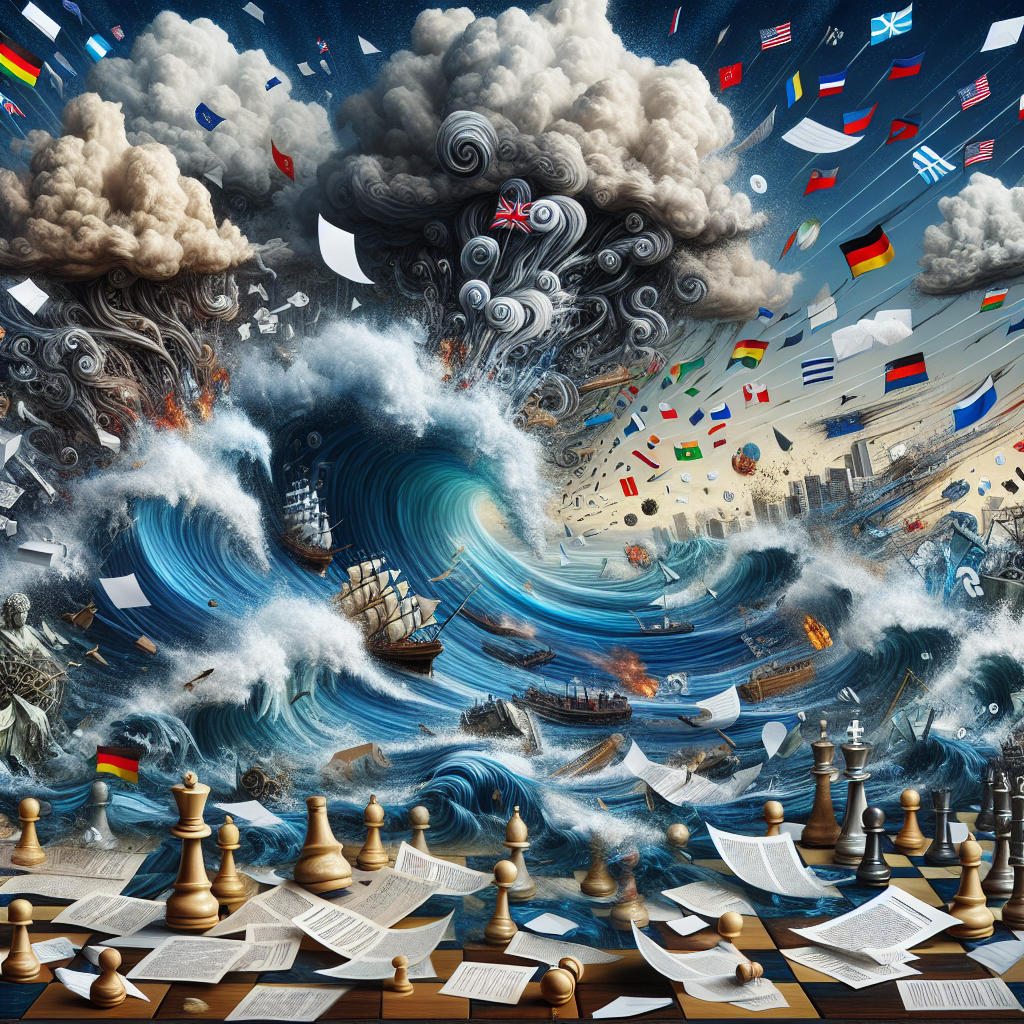Navigating the Chaotic Waves of Governance and Geopolitics: Inside the Decision-Making Vortex
In the cacophonous arena of global politics, each day unfurls with the unpredictability of a storm—capricious, forceful, and often times, unforgiving. From the immediate threat of imposing lockdowns to the erratic symphony of international relations, the decision-makers are entrenched within a relentless barrage of choices and consequences, all while under the scrutinous gaze of a vigilant media and a restless populace.
The Morning Whirlwind: Lockdowns and Political Spectacles
Imagine embracing the break of dawn not with a serene cup of coffee but with the troubling deliberation—are the streets to be emptied in the face of an unseen viral adversary? The relentless pandemic, a specter that has haunted nations, mandates an immediate and decisive response. Lockdowns, a term now indelibly etched into the modern lexicon, emerge as a draconian yet necessary tool to stifle the viral spread. The toll it takes, however, is not merely on the health of the citizens but also on the political lifeblood of the decision-makers.
As the day accelerates, the prime minister's significant other is caught in a maelstrom of her own making—an outburst perhaps, or a miscalculated comment—fueling the relentless furnace that is the media's attention. Drama, it seems, is an inseparable companion to politics, and the personal becomes inextricably political. It is an unwelcome distraction for those who must balance the scales of public health and civil liberties.
The International Chessboard: Allies, Adversaries, and Anxieties
No sooner has the domestic dust settled than the international phone lines begin to buzz. A call from across the seas—a voice, instantly recognizable and laden with authority—Trump rings with a directive that seems to stem more from impulse than strategy: to rain fire upon targets in Iraq.
The intricacies of geopolitical alliances and the weight of a superpower's expectations press heavily upon the decision-makers. To bomb or not to bomb? These choices, distilled into disturbingly simple terms, belie the profound complexities underlying them. Striking out against another nation is not merely an act of military execution; it is a statement, a commitment, a strategic motion that reverberates through the annals of history and the lives of many.
The Shadow Play: Deep State and Its Counterparts
Beneath the visible layer of politics, there's an enigmatic force often referred to as the Deep State—a body within a body, an influence that tugs at the strings of power, often invisible and unaccountable. Their argument introduces a note of caution: intelligence reports, they claim, whisper the risk of collateral damage, of bombs raining on the innocent—mistakes that are indelible and impermissible.
This advice, born of experience and the somber lessons of history, urges restraint. Yet, others within this complex network disagree, championing action over inaction, power plays over prudence. Their reasoning, draped in the flag of diplomacy and alliance, posits that maintaining strong bonds with America is paramount, a non-negotiable aspect of international politics, even if it rides on the swift wings of warplanes.
The Bureaucratic Behemoth: A System Creaking Under Strain
The hands that turn the wheels of governance are not solely those of leaders elected under the spotlight of democracy. There exists a colossal entity, a bureaucratic behemoth—age-old, sprawling, and often sluggish. This machinery of the state, with its multitudes of cogs and gears, is tasked with translating political will into actionable reality.
Faced with a deluge of decisions and information, the bureaucracy lumbers on. It's an organism designed for stability and predictability, caught in the crosshairs of an era that is anything but. The challenge then is not only to make the right choices but to implement them through an apparatus that is perhaps ill-suited to the frenetic pace of modern crises.
The Weight of the World: Decision-Making in the Eye of the Storm
Set against this backdrop, the handful of individuals at the heart of this vortex must weave through a labyrinth of moral, strategic, and practical considerations. The gravity of their decisions hangs heavy in the air—their repercussions felt in lives saved or lost, wars waged or averted, alliances upheld or fractured.
The frenzied dance of politics, the courtship and conflicts with powers domestic and foreign, the ceaseless scrutiny of media, and the Herculean task of mobilizing the state’s vast machinery—these are the daily travails of the decision maker. It is a high-stakes game where the right answers are as elusive as they are vital, and where the only constant companion is the weight of consequence.
In the quest to understand and articulate the profound complexities and dizzying pace of governance and geopolitics, there is a need to go beyond the surface. For those interested in the inner workings, one might look toward scholarly articles and books that dissect the concept of the Deep State, analyze political crisis management, and elaborate on the psychological toll of leadership positions. Websites like the Council on Foreign Relations provide deep insights into global policies and international relations that could further illuminate the inner corridors of power and decision-making.
To understand the well-worn paths and emerging trends of the bureaucratic machinery, exploring literature on public administration and the effects of modern technology on government processes could provide valuable context.
Navigating these treacherous waters requires more than just knowledge—it demands empathy, patience, and, perhaps most importantly, the resilience to shoulder the immense burden of leadership. In a world that seems to spin faster with each passing day, the task is Herculean, and the individuals who undertake it are nothing short of remarkable.
Related News
- The Conspiracy of Distraction in Modern Governance
- Navigating the Labyrinth: A Sardonic Analysis of Government Dysfunction
- The Grand Illusion of Political Theatre: A Deep Dive into the Heart of Governance Facades
- Government's Inertia: An In-depth Analysis
- Peering Into the Abyss: The Shadow of Global Conflict in the Modern Era
